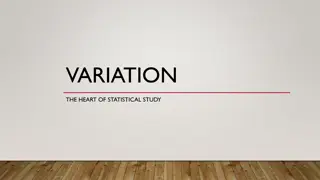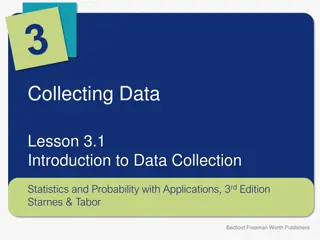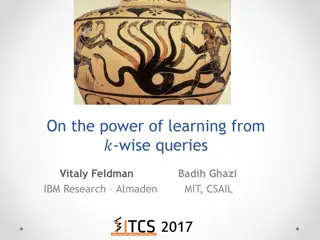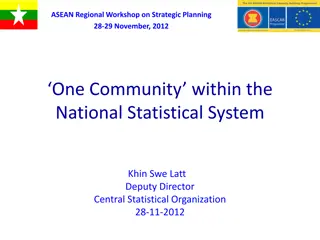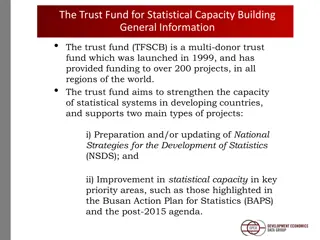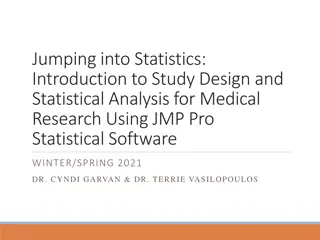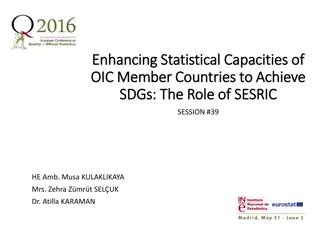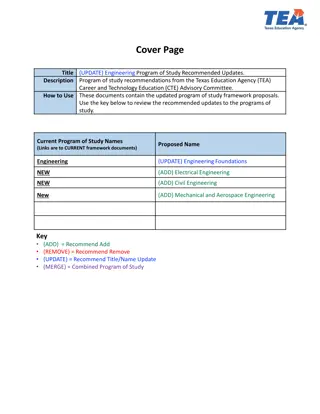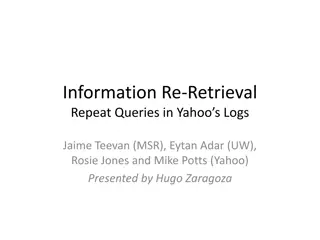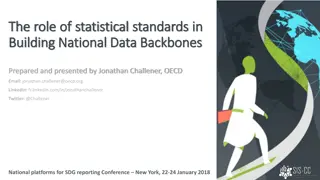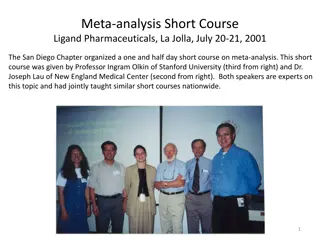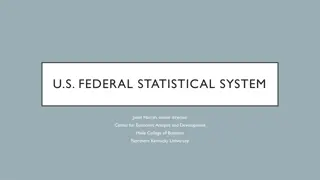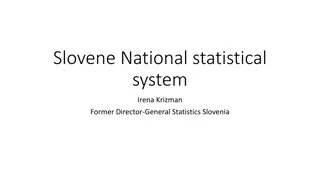Statistical Engineering - Finding Our Identity
Caleb and Lindsay King explore the definition and relationship of Statistical Engineering to Statistics and other analytic disciplines, aiming to clarify the field's identity and importance. They delve into potential sources of confusion and the nature of Statistical Engineering as a multi-disciplinary approach to solving sustainable problems.
Download Presentation

Please find below an Image/Link to download the presentation.
The content on the website is provided AS IS for your information and personal use only. It may not be sold, licensed, or shared on other websites without obtaining consent from the author.If you encounter any issues during the download, it is possible that the publisher has removed the file from their server.
You are allowed to download the files provided on this website for personal or commercial use, subject to the condition that they are used lawfully. All files are the property of their respective owners.
The content on the website is provided AS IS for your information and personal use only. It may not be sold, licensed, or shared on other websites without obtaining consent from the author.
E N D
Presentation Transcript
1 Statistical Engineering: Finding our Identity WHAT DO WE THINK IT IS? WHAT DO OTHERS THINK IT IS? WHAT DO WE WANT IT TO BE? For consideration. By Caleb & Lindsay King
2 Who Are We Exactly? After the 2nd ISEA Summit, it seemed there was still some lingering confusion regarding the new field of Statistical Engineering. This confusion seemed especially evident as I tried to discuss this new field with my wife. Caleb has a Ph.D. in Statistics and is practicing Statistician. Lindsay has a Masters in Applied Mathematics and works as an IT Project Management Consultant. This presentation is the result of evening discussions over several weeks trying to understand the confusion.
3 Potential Sources of Confusion Through our discussions, we settled on two potential sources of confusion: How does Statistical Engineering relate to Statistics? How does Statistical Engineering relate to other analytic disciplines? Other Analytic Disciplines Statistical Engineering Statistics
4 What do we say is Statistical Engineering? Definition: The study of the systematic integration of statistical concepts, methods, and tools, often with other relevant disciplines, to solve important problems sustainably. (ISEA Handbook) What does this definition mean? statistical concepts, methods, and tools - This field is inherently tied to the field of Statistics. What is the nature of this relationship in light of the definition of Statistics? often with other relevant disciplines - This field has the opportunity to be multi-disciplinary. What is the nature of this field s relationship to these other relevant disciplines ? What exactly are these other relevant disciplines ? solve important problems sustainably This field is focused only on a certain class of problems. What makes a problem important? Who determines the importance of the problem?
5 HOW DOES STATISTICAL ENGINEERING RELATE TO STATISTICS? Finding Ourselves
6 Statistical Engineering is to Statistics as In the ISEA Handbook, Statistical Engineering and Statistics is compared to Chemical Engineering and Chemistry. At its core, this example is meant to evoke the relationship between a scientificdiscipline and an engineering discipline. So naturally, the next question is what makes a discipline/field a scienceand what makes it an engineering discipline? to Google!!
7 Science vs. Engineering Science (as a discipline) is A branch of knowledge or study dealing with a body of facts or truths systematically arranged and showing the operation of general laws (Dictionary.com) A department of systematized knowledge as an object of study (Merriam-Webster) A systematic enterprise that builds and organizes knowledge in the form of testable explanations and predictions about the universe (Wikipedia) So, a science discipline is one that systematically acquires knowledge about a particular subject. Engineering (as a discipline) is The art or science of making practical application of the knowledge of the pure sciences (Dictionary.com) The application of science and mathematics by which properties of matter and the sources of energy in nature are made useful to people (Merriam-Webster) [The application of] mathematics and sciences to find novel solutions to problems or improve existing solutions (Wikipedia) So, an engineering discipline practically applies scientific knowledge to solve problems.
8 Engineering vs. Application If an engineering discipline is all about application, what makes it different from an applied discipline? The word engineering comes from the Latin word ingenium , meaning cleverness The term is meant to evoke a creative solution as opposed to a straightforward one. One could argue then the following distinction: If the problem is well defined such that the solution can be quickly derived using standard techniques with minimal effort, then it is an applied solution. If the problem is not well defined or is of such nature that the solution can only be derived through creative use of known techniques, then it is an engineering solution. Since Statistical Engineering is meant to address the difficult and not well defined problems, it is appropriate to think of it as an engineering discipline.
9 An Illustrative Example Hi! I am a Chemist. Hi! I am a Chemical Engineer. I I Research the properties of elementary forms of matter. (Dictionary.com) Investigate the transformations of substances. (Merriam- Webster) Study the compositions of atoms and molecules. (Wikipedia) Apply chemical knowledge to industrial processes. (Dictionary.com, Merriam- Webster) Use the principles of chemistry and other fields to efficiently produce and transform energy and materials. (Wikipedia)
10 Science vs. Engineering We ll use the following table to visualize the distinction between science and engineering and help us determine where Statistics should go. Science: Engineering: Systematic Acquisition of Knowledge Systematic Application of Knowledge Chemistry Chemical Engineering
11 What about Statisticians? Hi! I am a Statistician. Hi! I am a Statistician. I I Study how best to collect, analyze, interpret, and present large quantities of data. (Merriam-Webster, Wikipedia) Often work with subject matter experts from other fields to solve their problems with data-driven solutions. Research how to use mathematics to impose order and regularity on aggregates of disparate elements. (Dictionary.com) Develop new tools for analyzing and collecting data.
12 Science vs. Engineering Science: Engineering: Systematic Acquisition of Knowledge Systematic Creative Application of Knowledge Chemistry Chemical Engineering Where should Statistics go? Let s see what happens as we explore the different placement options for Statistics
13 If Statistics is primarily an Engineering Field Science: Engineering: Systematic Acquisition of Knowledge Systematic Creative Application of Knowledge Chemistry Chemical Engineering Probability theory? Mathematics? Statistics (a.k.a. ProbabilityEngineering ??) If this is the appropriate placement, then If Statistics is already an Engineering Field, what need is there for a new discipline? Do we just need better training as Statisticians?
14 If Statistics is both a Science & Engineering Field It fits into our table like this: Science: Engineering: Systematic Acquisition of Knowledge Systematic Creative Application of Knowledge Chemistry Chemical Engineering Statistics (Statistical Science/Statistical Practice) then where does Statistical Engineering fit? If this is the appropriate placement then We have the same questions as before.
15 If Statistics is primarily a Science Science: Engineering: Systematic Acquisition of Knowledge Systematic Creative Application of Knowledge Chemistry Chemical Engineering Statistics then Statistical Engineering might fit nicely here If this is the appropriate placement, then Should Statisticians whose primary work consists of consulting and application rebrand themselves as Statistical Engineers ? Should Mathematical Statisticians drop the Mathematical part since their work is now just Statistics? Same for Statistical Scientists, since that label is now redundant? What exactly does the field of Statistics acquire knowledge about? What is the specific field of study now?
16 HOW DOES STATISTICAL ENGINEERING RELATE TO OTHER ANALYTICS DISCIPLINES? Finding Our Place
17 Statistical Engineering Diagram Consider this diagram (originally designed by Dr. Geoff Vining): Soft Skills Team Building Collaboration SME Knowledge Better, Faster Solutions to Complex Problems What is the exact nature of this relationship? Statistical Engineering: Strategy and Tactics General Analytic Fields (i.e. Statistics, Data Science, Business Analytics) Industrial Analytic Fields (i.e. Industrial Systems Engineering, Operations Research, M&S) Non-Analytic Fields (i.e. Organizational and Behavioral Psychology) Tools
18 Statistical Engineering as Collaboration If Statistical Engineering is intended to solely collaborate with other analytics fields then Statistical Engineering is yet another analytics discipline with its own advantages and disadvantages. Statistical Engineering Operations Research It can partner with and borrow tools from other disciplines to solve complex problems. What is it that we bring to the table? What do we provide that the other disciplines do not? Data Science Business Analytics A great illustration is a case study from the ISEA webinar series. Leo C.E. Huberts and Ronald J.M.M. Does (University of Amsterdam) Statistical Engineering and Machine Learning: A Case Study to Predict Student Success or Failure. In the talk, two statistical methods were compared to a relativistic neural network; statistical engineering and machine learning each treated as distinct fields from one another.
19 Statistical Engineering as Consolidation If Statistical Engineering is intended to consolidate other analytics fields then Statistical Engineering Statistical Engineering is an attempt to unite all other analytics disciplines into one overarching discipline. Other disciplines simply become specialties for a Statistical Engineer. Business Analytics Data Science Is it fair to call this consolidated field Statistical Engineering , a term clearly favoring one discipline over the others? Wouldn t a more general term be appropriate? Operations Research
20 WHAT DO WE WANT TO BE? Clearing Confusion HOW DO WE GET THERE?
21 What Do We Want to Be? Consensus exists among ISEA members that the intended purpose of the discipline is: To teach students how better to apply statistical tools and techniques to generate sustainable solutions to complex problems. To prepare practitioners to be better collaborators/consultants and influence decisions in their companies. To integrate not only statistical concepts, but also concepts and methods from data science, information technology, business acumen, etc. To be practiced across a wide range of fields, including industry, biomedicine, business, and technology. What is the end goal of Statistical Engineering ? The answer to this determines how we get there. The original vision was to better prepare students for the complexities of real-world Statistical work. Is this still the sole vision? Or has the vision been expanded? We see at least three options going forward
22 How Do We Get There? Option 1: Courses Only Reasoning: Statistics is essentially a hybrid of science and engineering. Our focus should be on developing and maintaining coursework that better prepares students for real-world Statistical work. This would include being familiar with techniques from other analytics disciplines. Pros Cons This would be easier to accomplish than defining a new field. A new discipline will not be created. No major change to the status quo. The vision of better prepared Statisticians would quickly be achieved.
23 How Do We Get There? Option 2: Split Statistics Reasoning: Statistics would really benefit from splitting and refining. The term Statistics should represent the scientific focus while Statistical Engineering will cover the application focus. Training in Statistical Engineering would include being familiar with techniques from other analytics disciplines. Pros Cons The confusion of the difference between Statistics and Statistical Engineering is removed. A new discipline would be created at the expense of the old one. Other organizations will need to be convinced of the need for the split. Statistics and Statistical Engineering follows a similar history as Chemistry and Chemical Engineering.
24 How Do We Get There? Option 3: Level Up Reasoning: While there are some differences among analytics disciplines, there is also a lot they have in common. Uniting these disciplines under one field ( Analytical Engineering , say) would help practitioners wield the power of analytics more effectively. Pros Cons All analytic disciplines, both current and new, can easily be leveraged to work together. Statistical Engineering, in name and definition, would change. The discipline name does not favor one over the others. It expresses the common interest. It would take tremendous work to unify multiple disciplines under one banner. This discipline is wide-reaching in both toolsets used and problems solved.
25 Why Does This All Matter? The key ideas behind the Statistical Engineering movement are vital in an increasingly data-driven world. As the movement grows and evolves, it is very important we are consistent and clear in our focus. If not, we risk Statistical Engineering failing to develop. The goal of this presentation is to present thought-provoking questions and suggestions that shed light on areas of confusion and help guide the continued evolution of Statistical Engineering. In short, we believe that ISEA and Statistical Engineering need to answer the following questions: What is our value? What is our scope?
26 Thank You for your time and consideration!






